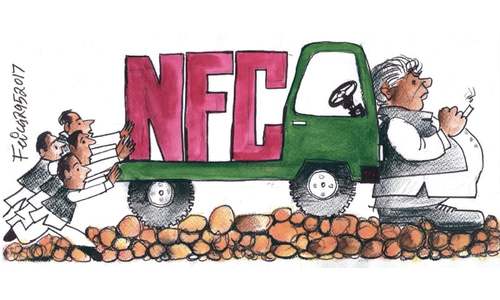The federal budget proposal and spike in development spending for the next fiscal year have promising elements for banks and other financial companies.
But bankers term the continuation of the 4pc super-tax for banks as ‘shocking’. Since the super-tax is lower at 3pc for non-banking companies and individuals, banks feel all the more irritated. “Even if this tax had to be extended, banks should have been treated at par with others,” says the head of a local bank.
Two years ago, a 3pc super-tax was levied on rich individuals, associations of persons and companies earning Rs500 million plus. For banks the rate was fixed at 4pc. Despite repeated pleas by banks, the super-tax was not withdrawn.
The government has lived up to its old promise of lowering corporate income tax by one percentage point each year and fixed it at 30pc for the next year. Banks welcome this move. “But we’ll seek the prime minister’s intervention for ending discrepancy in the super-tax regime,” an official of the Pakistan Banks Association (PBA) told this writer.
Bankers, however, admit that the budget is growth-propelling and could create more business opportunities for banks.
“Such measures like introduction of a massive annual PSDP (of Rs1.001 trillion), tax relief and incentives to agriculture, SMEs, IT and telecom sectors, along with budgetary schemes for promotion of credit disbursement to agriculture and SMEs give us hope. Banks lending is going to soar. Banks are going to get more business.”
During the current fiscal year, banks have so far (up to May 12) lent Rs519bn to the private sector, up 79pc compared to Rs290bn lending a year-ago. And, banks’ lending to public sector enterprises (PSEs) have also shot up to Rs252bn from a little below Rs45bn, latest official stats reveal.
“In the next year, private sector lending of banks should rise further if the economic agenda set out in the budget is pursued vigorously,” opines a senior executive of the state-run National Bank of Pakistan.
Bankers term the continuation of the 4pc super-tax for banks as shocking. They, however, admit that the budget could create more business opportunities for them
For FY18, the government has set Rs390bn target for its borrowings from the banking system, lower than Rs453bn for the current year.
Bankers say even if the government sticks to the target, the traditional practice of exceeding the borrowing target in most of the year and bringing it back to the targeted level by the end of the year would give banks enough room to gain huge profits on investment in zero-risk debt instruments.
“If real GDP grows 6pc, investment to GDP ratio moves up to 17pc (from 15.8pc) and the Rs1tr PSDP is executed as per plan; the banking business will get a real boost. Deposits will grow substantially, lending to private sector and PSEs will soar.
“Banks will also see growth in our non-interest income activities like investment advisory, technical consultation fees and charges on a money transfers and utility bills collection etc.”
Besides, the setting of Rs1.001tr agricultural credit disbursement target (exactly equal to the PSDP), up from this year’s Rs700bn, also promises big business for banks. A high-powered committee comprising SBP officials, bankers and representatives of the farming community, is already busy finalising a plan to give banks district-wise targets in agricultural credit distribution.
Above all, the Rs3.5bn risk mitigation facility for SMEs to be created at the SBP and the setting up of an Innovation Challenge Fund of Rs500m, also for SMEs, would boost the demand for SME credit and enable banks to meet the bulk of this demand, bankers say.
Bankers appreciate the budgetary announcement on exemption from withholding tax on cash withdrawals by branchless banking agents and establishment of Rs200m e-gateway system at the SBP.
They hope that these measures would create more banking business in the area of domestic trade, payments system and disbursements under social sector programmes. The fact that a huge amount of Rs121bn has been earmarked for financial assistance under the Benazir Income Support Fund and the government has promised Rs50,000 small loans for poor farmers will also create more banking activity.
The creation of Rs8bn fund at the SBP for giving small loans to low-income individuals through microfinance banks will also give these banks a chance to reach out to new borrowers.
“Once we interact with new borrowers, even for a specific purpose, we can always find additional lending opportunities in the future,” opines an official of Telenor Microfinance Bank.
The risk sharing guarantee scheme announced in the budget for promoting housing loans is also expected to remove a key impediment to growth in such loans. Under this scheme, the government will provide 40pc credit guarantee to banks and development finance institutions (DFIs) for home financing up to Rs1m. The budget has set aside Rs6bn for this purpose.
Besides, the proposed establishment of the Pakistan Infrastructure Bank, with active support of the IFC, will helps banks and DFIs come up with innovative project financing tools and thus lead to greater infrastructure financing by banks and financial institutions.
Enhancement of tax exemption limit for exemption from withholding tax on premium (from Rs200,000 to Rs300,000) is expected to give relief to insurance companies from collection of premiums from non-tax filers.
And, the budgetary announcement of providing ‘tax neutrality’ to all Islamic modes of financing will help Islamic banks and Islamic banking branches lend more to the private sector, bankers say.
Lending to the private sector by Islamic banks and Islamic banking branches of conventional banks constitute roughly 40pc of the total private sector lending of banks.
Published in Dawn, The Business and Finance Weekly, May 29th, 2017














































